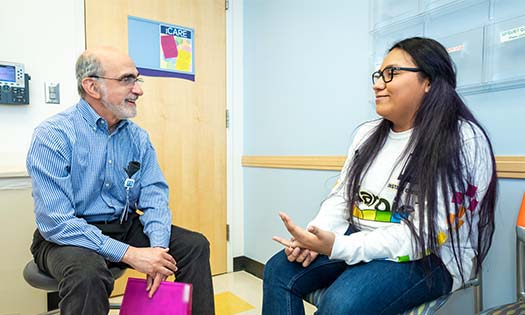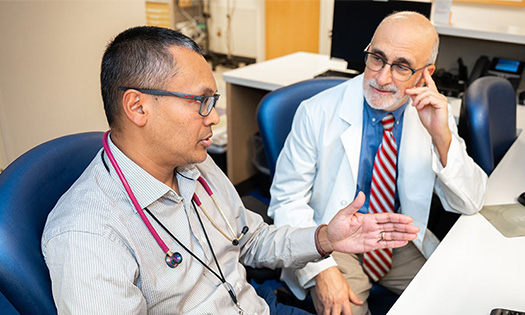Until recently, children with type 1 diabetes have had no way to slow progression of their disease. But now Tzield® (teplizumab-mzwv), an immunotherapy approved last year by the FDA, offers children in Stage 2 type 1 diabetes (T1D) the chance to delay the onset of Stage 3.
Abha Choudhary, M.D., Pediatric Endocrinologist at Children’s Medical Center Dallas, part of Children’s HealthSM, and Associate Professor at UT Southwestern, was a co-investigator in the clinical trial studying Tzield’s safety and efficacy.
“Delaying Stage 3 means children can also delay insulin therapy and avoid sudden and extreme consequences like diabetic ketoacidosis,” she says.
With an effective treatment available for the first time, Dr. Choudhary says providers now have extra incentive to screen children for T1D before symptoms appear.
“Screening is simple and especially important for children with a family history of T1D,” she says.
The big picture: T1D often undiagnosed until intervention is critical
About 1 in 300 children in the U.S. are diagnosed with T1D by age 18. But many aren’t diagnosed until the disease is advanced, because symptoms don't appear until Stage 3.
In some cases, the first sign of T1D is diabetic ketoacidosis (DKA), a potentially lethal result of the body’s attempt to compensate for high blood sugar. The liver breaks down fats to provide fuel for the body, but the process also releases ketones that can reach toxic levels in the blood.
DKA and other consequences that emerge in Stage 3 T1D result from autoimmune activity that begins in Stages 1 and 2 – specifically, the destruction of beta cells in the pancreas.
“That’s where Tzield comes in,” says Dr. Choudhary.
Key details: Clinical trial patients delayed Stage 3 by 2 years
Tzield is a monoclonal antibody that binds to CD3 antigens on the surface of T cells and inhibits their ability to attack the pancreas. It is approved for adults and children ages 8 and above with Stage 2 T1D and is administered by intravenous infusion once a day for 14 consecutive days.
In a multicenter, double-blind, randomized trial, the median time to Stage 3 diagnosis was roughly 4 years for patients taking Tzield, compared to 2 years for the placebo group.
“Two more years without regular blood sugar checks and insulin injections – that’s a lot of needle pokes families will be happy to avoid,” Dr. Choudhary says.
Now that families can take action to slow the progression of T1D, Dr. Choudhary predicts more children will get screened and diagnosed during Stage 1 and Stage 2, leading to fewer cases of DKA. And there may be even more benefits to come.
“We’re currently studying whether Tzield helps prolong the honeymoon phase in Stage 3. Expect results soon,” she says.
Impact on primary care: Screen for T1D before symptoms appear
Stage 2 T1D is defined by the presence of two or more T1D-related antibodies in the blood and fluctuating glucose levels without overt hyperglycemia.
“The antibodies prove it’s type 1 and not type 2, which is very important because Tzield is only approved for T1D,” adds Dr. Choudhary.
Physicians can order diabetes antibodies and glucose testing via commercial labs or can refer patients to TrialNet, which offers free screening and access to clinical trials in those individuals who have a family history of T1D.
Most cases of T1D occur outside of any family history, so screening is valid for all children.
“But it’s especially important for children with T1D in their family, who are 15 times more likely to develop the condition themselves,” Dr. Choudhary explains.
Why Children’s Health: Helping pioneer a new era of T1D care
In September 2023, Dr. Choudhary’s team was one of the first to provide Tzield to a pediatric patient. They offer Tzield to children as young as 8 and have experience in all aspects of arranging and providing treatment, including:
Patient evaluation – Prior to infusion, the team tests eligible patients for signs of infection, liver problems and other factors that can interfere with treatment.
Insurance approvals – Tzield is approved by Medicaid and most commercial insurance providers, but the approval process can still take months to complete. “This is customary with new therapies, and I expect it will speed up over time,” Dr. Choudhary says.
Preventing side effects – About 10% of patients taking Tzield experience cytokine release syndrome (CRS). CRS is an overproduction of cytokines, an immune agent, that may occur in response to infection or immunotherapy. To prevent CRS, the infusion team premedicates children with benadryl, Tylenol and Zofran.
Dive in deeper with Dr. Choudhary on a recent podcast interview where she discusses how Tzield is being used treat Stage 2 T1D to delay the onset of Stage 3 T1D.
Have a patient that might benefit from Tzield?
After confirming a diagnosis of Stage 2 T1D, providers can refer patients to Children’s Health via phone (Dallas: 214-456-5969; Plano: 469-303-2406) or fax (Dallas: 214-456-3386; Plano: 469-303-2407), specifying “Tzield infusion” in the referral.
Learn more about our nationally recognized Pediatric Endocrinology Program at Children’s Health >>


